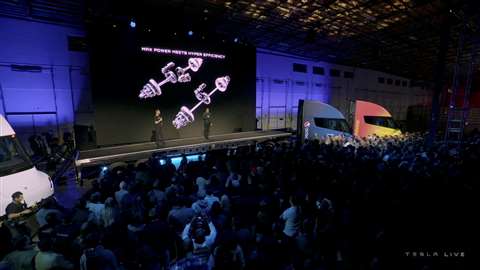Tesla delivers first production Semi
05 December 2022
Heavy-duty truck shares components with Tesla Model S
 Dan Priestly, senior manager of Tesla Semi Truck Engineering, and Tesla CEO Elon Musk discuss the new truck on stage during an event in Sparks, Nev., Dec. 1. (Photo: Reuters)
Dan Priestly, senior manager of Tesla Semi Truck Engineering, and Tesla CEO Elon Musk discuss the new truck on stage during an event in Sparks, Nev., Dec. 1. (Photo: Reuters)
Tesla Inc. has delivered its first production heavy-duty truck to PepsiCo during a live-streamed event at the company’s factory in Sparks, Nev.
Company CEO Elon Musk said the battery-powered long-haul truck would reduce highway emissions, outperform existing diesel models on power and safety and spin-off a fast-charging technology Tesla would use in its upcoming Cybertruck pickup. The company did not share updated forecasts for the truck’s pricing.
“If you’re a trucker and you want the most badass rig on the road, this is it,” Musk said, noting that it was five years since Tesla had announced it was developing the all-electric truck. Still, industry experts remain skeptical that battery electric trucks can take the strain of hauling hefty loads for hundreds of miles economically.
In 2017, Tesla had said the 300-mile range version of the Semi would cost $150,000, and the 500-mile version $180,000, but Tesla’s passenger electric vehicle prices have increased since then.
Robyn Denholm, chair of Tesla, recently said the automaker might produce 100 Semis this year. Musk has said Tesla would aim to produce 50,000 of the trucks in 2024.
PepsiCo, which completed its first cargo run with the Tesla truck to deliver Frito-Lay snacks for those attending the Nevada launch event, had ordered 100 trucks in 2017.
Anheuser-Busch, United Parcel Service Inc. and Walmart Inc. were among other companies that had reserved the Semi. Tesla did not provide details on orders or deliveries to customers, nor an estimate on what the total cost of ownership for future buyers would be compared to diesel alternatives.
Tesla also said it would begin using the Semi to ship parts to its plant in Fremont, Calif.
Musk said the Semi has been doing test runs between Tesla’s Sparks factory and its plant in Fremont. Tesla said it had completed a 500-mile drive on a single charge, with the Semi and cargo weighing in at 81,000 lb in total.
The Tesla Semi is capable of charging at 1 MW and has liquid-cooling technology. It uses three electric motors developed for Tesla’s performance version of its Model S, with only one of them engaged at highway speed and two in reserve for when the truck needs to accelerate, a feature that makes the truck more energy-efficient, Musk said.
Tesla had initially set a production target for 2019 for the Semi, which was first unveiled in 2017. In the years since, rivals have begun to sell battery-powered trucks of their own. Daimler’s Freightliner, Volvo, startup Nikola and Renault are among Tesla’s competitors in developing alternatives to combustion-engine trucks.
Walmart said it has been testing Freightliner’s eCascadia and Nikola’s Tre BEV trucks in California.
STAY CONNECTED




Receive the information you need when you need it through our world-leading magazines, newsletters and daily briefings.
POWER SOURCING GUIDE
The trusted reference and buyer’s guide for 83 years
The original “desktop search engine,” guiding nearly 10,000 users in more than 90 countries it is the primary reference for specifications and details on all the components that go into engine systems.
Visit Now
CONNECT WITH THE TEAM










